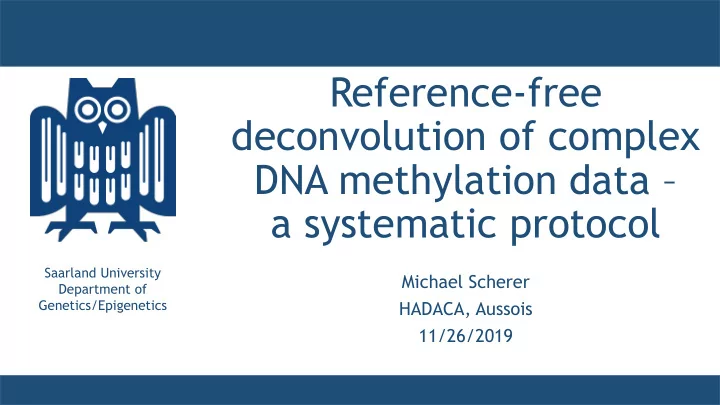

Reference-free deconvolution of complex DNA methylation data – a systematic protocol Saarland University Michael Scherer Department of Genetics/Epigenetics HADACA, Aussois 11/26/2019
Overview • Introduction into DNA methylation • DNA methylation-based deconvolution • Systematic protocol for DNA- methylation based deconvolution using MeDeCom • Application of the proposed protocol on TCGA data • Conclusions 11/22/2019 Michael Scherer 2
DNA methylation • Reversible epigenetic modification • Almost exclusively in CpG context 11/22/2019 Michael Scherer 3
DNA methylation • Reversible epigenetic modification • Almost exclusively in CpG context • Transcriptional repression in promoter regions 11/22/2019 Michael Scherer 4
DNA methylation • Reversible epigenetic modification • Almost exclusively in CpG context • Transcriptional repression in promoter regions • Highly cell type specific Figure: tSNE plot of WGBS data from different cell types assayed in the DEEP 1 and BLUEPRINT 2 consortia 1 http://www.deutsches-epigenom-programm.de/ 2 http://www.blueprint-epigenome.eu/ 11/22/2019 Michael Scherer 5
DNA methylation based deconvolution Reference-based deconvolution Reference-free deconvolution 11/22/2019 Michael Scherer 6
DNA methylation based deconvolution Reference-based deconvolution Reference-free deconvolution • Houseman approach 1 • RefFreeCellMix 4 • MethylCIBERSORT 2 • EDec 5 • EpiDISH 3 • MeDeCom 6 1 Houseman, E. A. et al. DNA methylation arrays as surrogate measures of 1 Houseman, E. A. et al . Reference-free cell mixture adjustments in cell mixture distribution. BMC Bioinformatics 13 , (2012). analysis of DNA methylation data. Bioinformatics 30 , 1431 – 1439 (2014). 2 Chakravarthy, A. et al. Pan-cancer deconvolution of tumour composition 2 Onuchic, V. et al. Epigenomic Deconvolution of Breast Tumors Reveals using DNA methylation. Nat. Commun. 9 , (2018). Metabolic Coupling between Constituent Cell Types. Cell Rep. 17 , 2075 – 3 Teschendorff, A. E et al. A comparison of reference-based algorithms 2086 (2016). 3 Lutsik, P for correcting cell-type heterogeneity in Epigenome-Wide Association . et al. MeDeCom: discovery and quantification of latent Studies. BMC Bioinformatics 18 , 105 (2017). components of heterogeneous methylomes. Genome Biol. 18 , 55 (2017). 11/22/2019 Michael Scherer 7
Non-negative matrix factorization 11/22/2019 Michael Scherer 8
Key messages from HADACA 2018 • Only small performance differences between the three available reference-free deconvolution tools ( RefFreeCellMix , EDec , MeDeCom ) on in-silico mixed data • Thorough data processing more important than choice of the deconvolution tool • Accounting for confounding factors critical for obtaining biologically plausible results 1 1 Decamps, C. et al. Guidelines for cell-type heterogeneity quantification based on a comparative analysis of reference-free DNA methylation deconvolution software. Preprint at https://www.biorxiv.org/content/10.1101/698050v1.abstract (2019). 11/22/2019 Michael Scherer 9
Systematic protocol for DNA methylation based deconvolution 11/22/2019 Michael Scherer 10
DecompPipeline 1 • Data import using the widely-used RnBeads 2 software package • Three-step procedure • Quality-aware filtering • Accounting for confounding factors using independent component analysis (ICA 3 ) • Selecting potentially informative CpGs 1 https://github.com/lutsik/DecompPipeline 2 Müller, F . et al. RnBeads 2.0: comprehensive analysis of DNA methylation data. Genome Biol. 20 , 55 (2019). 3 Nazarov, P . V et al. Deconvolution of transcriptomes and miRNomes by independent component analysis provides insights into biological processes and clinical outcomes of melanoma patients. BMC Med. Genomics 12 , 132 (2019). 11/22/2019 Michael Scherer 11
Confounding factor adjustment using ICA 11/22/2019 Michael Scherer 12
Confounding factor adjustment using ICA 11/22/2019 Michael Scherer 13
Protocol overview 11/22/2019 Michael Scherer 14
MeDeCom 1 • Regularized non-negative matrix factorization • Critical parameter choices: • Number of latent methylation components (LMCs, K ) • Regularization parameter ( λ ) • Optimized using an alternate optimization scheme • Cross validation error computed 1 Lutsik, P . et al. MeDeCom: discovery and quantification of latent components of heterogeneous methylomes. Genome Biol. 18 , 55 (2017). 11/22/2019 Michael Scherer 15
RefFreeCellMix and EDec • Similar approaches as MeDeCom • Seamless integration into the protocol 11/22/2019 Michael Scherer 16
Protocol overview 11/22/2019 Michael Scherer 17
FactorViz 1 overview • R/Shiny application to visualize deconvolution results • Evaluation and interpretation functions • Proportions and LMC matrix biologically interpreted 1 https://github.com/lutsik/FactorViz 11/22/2019 Michael Scherer 18
FactorViz: Interface 11/22/2019 Michael Scherer 19
FactorViz: Functions 11/22/2019 Michael Scherer 20
Application to TCGA LUAD dataset • 461 samples from the lung adenocarcinoma dataset from TCGA 1 • Assayed using the Illumina Infinium 450k BeadChip 1 https://cancergenome.nih.gov/ 11/22/2019 Michael Scherer 21
QC on TCGA data 11/22/2019 Michael Scherer 22
Parameter selection 11/22/2019 Michael Scherer 23
Proportions heatmap 1 1 Aran, D., Sirota, M. & Butte, A. J. Systematic pan- cancer analysis of tumour purity. Nat. Commun. 6 , 1 – 11 (2015). 11/22/2019 Michael Scherer 24
Phenotypic trait associations 11/22/2019 Michael Scherer 25
LMC LOLA 1 enrichment analysis 1 Sheffield, N. & Bock, C. LOLA:Enrichment analysis for genomic region sets and regulatory elements in R and Bioconductor. Bioinformatics 32 , 587 – 589 (2016). 11/22/2019 Michael Scherer 26
Sample-specific marker gene expression 11/22/2019 Michael Scherer 27
Conclusions • Thorough data processing and biologically guided interpretation more critical than the deconvolution tool itself • Three-stage protocol • Quality-adapted CpG filtering and confounding factor adjustment with ICA using DecompPipeline • Methylome deconvolution using MeDeCom , RefFreeCellMix or EDec • Validation and interpretation of deconvolution results with FactorViz • Deconvolution of TCGA LUAD dataset shows indications of immune cell infiltration, stromal, and epithelial components 11/22/2019 Michael Scherer 28
Acknowledgements Pavlo Lutsik Petr V. Nazarov Reka Toth Tony Kaoma Valentin Maurer Christoph Plass Jörn Walter Thomas Lengauer Shashwat Sahay 11/22/2019 Michael Scherer 29
Recommend
More recommend